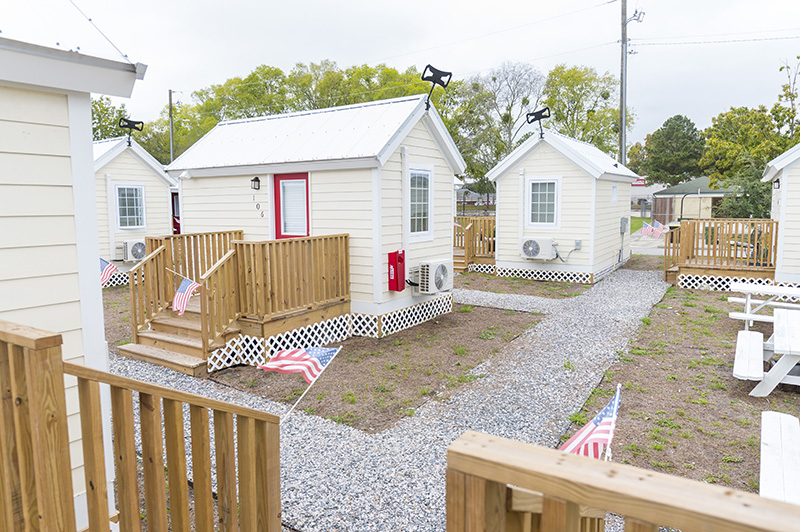
Building new lives for veterans, one tiny home at a time
On more than three acres near the corner of Dundee and Wheaton streets, 24 of Savannah’s first tiny homes are bedecked with American flags waving off their wooden porches. Inside, in just over 125 square feet, formerly homeless veterans each have a bed, a full bathroom, a kitchenette — and a new lease on life. Five years in the making, the neighborhood, called The Cove at Dundee, stands proudly today thanks to local churches, schools, foundations, builders and businesses who contributed time, money and sweat. According to two leaders on the project, some credit belongs to God. And HGTV, of course.
More than five years ago, Cindy Kelley was unwinding from a long day’s work with a glass of wine and some television. The executive director of the Chatham Savannah Authority for the Homeless works with some of the city’s most vulnerable people — a population that climbed to more than 4,600 receiving services in 2018, and 280 of them veterans. [Ed. note: These numbers reflect everyone who was tracked as homeless for at least one night in 2018, according to the Chatham Savannah Authority for the Homeless.]
The nonprofit was not having a substantial impact on reducing those numbers, and not because of the “great myth” of people wanting or choosing to be homeless, Kelley says. Instead, she found the main obstacle was “a critical shortage of affordable housing.”
“Housing is a fundamental need for people to be able to heal and address their issues,” Kelley says. “It’s the No. 1 thing that would help.”

More than 13,000 families are on waiting lists for public housing or housing choice vouchers through the 2018 Housing Authority of Savannah Waiting Lists, and according to the Chatham County Housing Coalition fact sheet, fair market rents in Savannah far exceed what most hourly wage workers can afford to pay. A $10 hourly worker working 40 hours a week, for example, could afford a rent of $520 to stay under the threshold of spending 30 percent on housing. A one-bedroom fair market rent in Savannah is $870.
As wages decrease, the situation gets more dire: A minimum wage worker would have to work 92 hours a week to be able to afford Savannah rents on their budget, according to the fact sheet.
As she sat on her couch with the channel set to HGTV, a program on tiny homes gave her the spark of an idea.
In a similar flash, after a Sunday sermon right across town, senior principal at Hansen Architects Gene Maria felt moved to act. His pastor, Andy Blair of Tapestry Church, had asked the congregation to use their God-given talents for good.

Maria met Kelley with a pitch for a mobile shower unit for the homeless. Of course, she was already connecting the dots for something bigger. Kelley had already been working to secure support, donors and property for a village of tiny homes for veterans, as well as to raise awareness for affordable housing needs.
At first, Kelley envisioned a community of just eight to 10 dwellings, at a total cost of about $200,000. After a number of sites fell through, she received a call from the owner of property across the street from the nonprofit’s headquarters, which had been used as a homeless camp for 20 years. There was so much garbage on the land, Kelley says, that the cleanup alone would be a big effort. But the acreage was much greater than the city lot she had envisioned, and so she went to her board with sweaty palms.
“Remember that $200,000 project?” she recalls asking. “What do you think about $2 million — and 72 homes instead of 10?”
Kelley says at first the board was overwhelmed by the increased scale of the project. But after weighing the time and money such an investment would entail, the nonprofit decided to tackle it in phases: one village of 12 homes at a time.

Construction on the first village began in earnest in fall of 2018. Maria at Hansen Architects worked with civil engineers at Thomas & Hutton on a site plan, city permits and actionable concept drawings. Hundreds of volunteers organized by the Nine Line Foundation and Joe Marchese Construction picked up their hammers to help build. Roofers, engineers, electricians and more also contributed their services. “It’s been a community effort, and it gives you some hope for humanity,” Maria says.
To date, the team has completed 24 inviting cottages, each filled with natural light, a fully outfitted kitchenette and donated porcelain tile from Eckards Flooring and Garden State Tile in the bathroom.
Here, as ever, good begets good. An on-site clinic provides medical care, Nine Line Foundation has committed to funding the construction of an aquaponics training center and a grant from Target will pay for a nutritionist to educate the residents on healthy cooking after years of eating in shelters, on the street and out of convenience stores. Donations of clothing, groceries, blankets and other necessities have poured in from Savannahians and donors around the country.
While the village has already been eyed as a model for other communities in Georgia, local fundraising and support gathering continues full steam ahead to ensure that the next villages proceed as planned.

Air Force veteran George Bacon, one of the neighborhood’s first 12 residents, says he is more at peace in his tiny home than anywhere he’s ever lived.
In the decades before he moved to The Cove at Dundee, Bacon saw firsthand that housing in Savannah was growing out of reach. He was raised at the corner of 36th and Jefferson streets in a two-story house his father paid $50 a month for in 1965. Today, that same home rents for $1,850.
He admits he had his own preconceptions about the homeless, before a divorce and disability left him in financial straits. Even as he let go of his possessions one by one and remained employed, he learned you can do everything right and still end up homeless.
“If you can’t find a place to rent in your own city, you have to leave,” Bacon says. “But if you leave, there’s no guarantee you’ll get the same type of job.”
Bacon calls himself blessed to be one of the first selected for a tiny home in The Cove at Dundee, where rent is $240 a month and the residents either work or are retired.
“I can sit here now, read my books and actually plan my future,” Bacon says.
Megan Hostler, CEO of the Nine Line Foundation, which has pledged support and organized volunteers from the beginning, says that was precisely the idea.
“Our goal is to get these veterans to transition to a better life — to help them regain the confidence they had when they were in the military,” she says. “Projects like this show them their service hasn’t been forgotten, and that their strength is in working together.”



